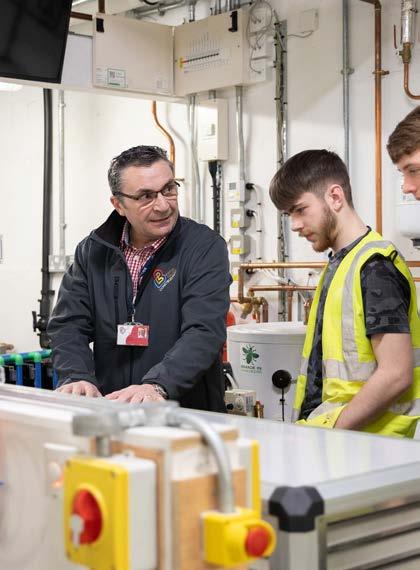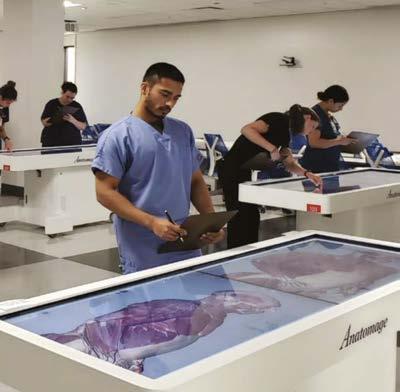


























The Bolton College Accountability Statement has been prepared in response to the Department for Education Guidance Document - Meeting Skills Needs: Guidance on Annual Accountability Agreements 2024/25 and the Local Needs Duty. DfE external document template (publishing.service.gov.uk)
Contents
Page 4-5
Purpose

Page 6-15
Context and Place
Page 16-27 Approach to Developing the Annual Accountability Statement
Page 28-33 Contribution to National, Regional, and Local Priorities

www.boltoncollege.ac.uk







Bolton College will enable individuals, businesses and communities within Bolton and the region to realise their potential through education and training that is inclusive, inspiring, innovative and responsive to their needs.
Values
• Excellence in all we do
• Ensuring learning and the student are at the heart of everything we do
• Equality of opportunity and celebration of diversity
• Serving our community
• Honesty and professionalism
• Caring for the environment and the communities we serve
1. Optimising opportunities across the merged group
2. Focusing efforts on the road to outstanding
3. Ensuring financial sustainability
4. Becoming a truly ‘digital college’
5. Being responsive to the communities we serve in Bolton and the City Region
www.boltoncollege.ac.uk
• Bolton College is a medium sized general Further Education College. The College’s main site is in the centre of Bolton and it operates from numerous other satellite areas in and around Bolton.
• The College offers provision in 14 of the 15 areas funded by the ESFA. The College offers employer responsive provision in health, public services and care; science and maths; engineering and manufacturing technologies; construction, planning and the built environment; information and communication technology; retail and commercial enterprise; leisure, travel and tourism; education and training; and business, administration and law.








Triple Distinction Star graded student and former Student Governor

A visit to Bolton College by The
and






• Bolton has a population of 296,000 (2021 Census). This is a 6.9% increase since the 2011 census and slightly above the overall increase for England.
• Bolton is richly diverse with around one fifth of the population from an ethnic minority background. According to Census (2021) data, the proportion of the population from an ethnic minority background significantly increased between 2011 and 2021. Pakistani is now the largest minority group (9.4%), followed by Indian (8.9%) (ONS Census 2021).
• Bolton includes some of the most affluent areas in the region and some of the poorest. 26% of the Bolton population live in an area that is among the 10% most deprived nationally, while 56% of the population live in an area that is among the 30% most deprived nationally. 4% of the Bolton population live in an area that is among the 10% least deprived nationally.
• As at September 2023, Bolton’s unemployed claimant count is at 5.4%. Although this has reduced slightly it remains 1.4% higher than North West (4.1%) and 1.7% higher than the national figure (3.7%). At 18% Bolton also has a significantly higher rate of workless households then 13.9% nationally. NOMIS-LMP 11/2023.
• 4.4% of 16 and 17-year olds in Bolton were described as NEET or activity not known in 2022. This is down from 0.3% in the previous year and compares well to other areas of Greater Manchester. (Post 16 Participation, NEET and Attainment Statistics 2023) www.boltoncollege.ac.uk
• Bolton has areas of high levels of deprivation and has a higher unemployment rate than both the North West and Great Britain as a whole. The College recruits a majority (65%) of its learners from these areas of high relative deprivation. Many learners face multiple barriers to their learning and the College is successful in supporting them to achieve their learning aims.
• Comparison to other GFE Colleges shows there is a greater proportion of learners (aged 16 to 18) that come to Bolton College without both GCSE English and GCSE Maths than the GFE College average for this age group.






Part of Life’s Essentials







Figure 1: Prior Achievement - GCSE English & Maths Grade 9-4 or equivalent as at the start of the 22/23 academic year.
Source: MiDES ILR R14 2022/23 (College Base: 1,846 learners)
This expresses the scale of the challenge the College faces in developing these skills for those young people that have failed to achieve in secondary education particularly with the importance of English and Maths to employability.
In 2022/2023 84.4% of students who have been involved in safeguarding cases, therefore facing some of the most complex and challenging barriers to learning, either achieved their qualification/s or remained on programme. In addition, high volumes of those learners accessing the counselling service achieved their learning aim. www.boltoncollege.ac.uk
Designated Employer Representative Body (ERB) and the Greater Manchester Local Skills Improvement Plan (GM LSIP)
Greater Manchester Chamber of Commerce is the designated Employer Representative Body (ERB) for developing and delivering the Local Skills Improvement Plan (LSIP) for Greater Manchester, which has been developed to identify and respond to local labour market needs that can best meet the relevant needs of businesses in the different local authorities within Greater Manchester.
Bolton College’s accountability statement responds to the Greater Manchester Local Skills Improvement Plan, The Greater Manchester Strategy (2021 – 2031) and Bolton Council’s strategy, Bolton Vision (2023 – 2030).
Greater Manchester City Region is home to c125,000 businesses who between them employ 1.34m people. Its economy delivers £77.8bn GVA (2022) and the City Region has an ambitious strategy for growth that aims to provide wider opportunities for its residents to access and benefit from jobs that are well paid, secure and offer good employment opportunities that will, ultimately, benefit businesses and residents in GM and beyond.
The Greater Manchester Strategy vision is one of ‘better lives for all.’ A significant part of this is about creating conditions for a fairer, greener, more prosperous GM so that its residents and businesses can look forward with confidence and ambition.






Sectors that have been identified as a priority for Bolton which also reflect the GM priorities and plans as to where future focus needs to be as regards economic growth:
• Construction
• Logistics
• Health

• Education
• Health Innovation
• Green/Net Zero
• Manufacturing

From the evidence gained through the GM LSIP survey work and employer interviews the following broader issues came up time after time as recurring evidence around skills shortages or barriers to recruitment. Bolton College recognise these as strategic priorities and connected with the sector/occupation specific skills shortages.
1. Basic IT/Digital Skills
2. Essential Literacy & Numeracy
3. Leadership & Management
4. Net Zero/Sustainability
5. Basic, Soft Skills specific to the Workplace
Bolton has a dynamic business base, and is home to some major businesses and employment sites. Major companies, including household brands like Warburtons and Greenhalghs, and cutting-edge manufacturing like MBDA, call Bolton home. Sites like Logistics North create a base for large multinational companies, such as Aldi, Lidl, Green King, Costam and Komatsu.
Bolton has sector specialisms with higher-than-average employment in manufacturing, logistics, wholesale and retail, and business services.
Overall Bolton’s business base is growing quickly, with high business birth rate and survival rates. Growth in high-output employment is shifting from manufacturing to knowledge-based sectors, with growth in professional services such as the financial and insurance sectors.
In recent years, fast-growing companies in digital, retail, energy and financial services have emerged, including AO, Parcel2Go, and Love Energy Savings.com. This trend may accelerate with Bolton working with Innovation Greater Manchester, the University of Bolton and Bolton College to develop plans around health innovation.
Despite these positives, the economy is underperforming. The size of the economy and productivity growth continue to be lower than comparators and the gap is widening between UK and Bolton. A £1bn productivity gap has been calculated between Bolton and the UK. The majority of this was due to in-work productivity issues – commuting; sector performance; and employment. Sectors in Bolton tend to be less productive than regionally and nationally.
Many residents and places in Bolton are not sharing in the prosperity that exists.









There are long term people challenges around economic inactivity and increasing numbers of residents are leaving the labour market. Digital and technical skills needs will continue to grow and change in many jobs and sectors.
Long term challenges are accompanied by recent and continued pressure on cost of living, inflation, and energy prices. Alongside the rest of the country, the residents, businesses and institutions of Bolton are experiencing and will likely continue to experience a rise in wage rates alongside a faster increase in the cost of goods, services, and energy, as well as a rise in interest rates.
The skills network document below visually represents the information provided in this section and the key stakeholders involved in shaping Bolton College’s curriculum offer and skills agenda priorities.
www.bit.ly/contribution-to-skills
Bolton College’s curriculum offer is ambitious and strategically planned to meet the employment, training and socio-economic priorities of Bolton, Greater Manchester and the wider region.
As an inclusive College, the curriculum is designed to give learners, including those with socio-economic or learning disadvantage, the knowledge, skills and behaviours they need to succeed and progress in learning, independent living, life and work.






The aspirational curriculum has a clearly defined purpose which is underpinned to the Bolton 2030 Vision, and is responsive to the skills, employment and training priorities of Bolton and Greater Manchester.
Close relationships with key stakeholders, such as the combined and local authorities, Department for Work and Pensions (DWP) and employers such as Bolton NHS Trust enable the College to meet Bolton’s ‘active, connected and prosperous’ agenda.
Collaboration with Public Health continues and has provided the opportunity for adults to become community ambassadors, supporting the council in disseminating localised Public Health messages. As part of this programme, tailored information, advice and guidance is provided to enable the ambassadors to create a programme of learning that will help them in their role, as well as future ambitions. Programmes designed by Bolton College, in collaboration with Public Health, are also helping to upskill health and care practitioners already in paid roles.
Board members have had direct involvement in shaping the Strategic Planning of Curriculum (SPoC) process with staff. Board members’ understanding of local and regional skills have been enhanced with training from the Greater Manchester Chamber of Commerce Director
leading on the Greater Manchester Local Skills Improvement Plan (LSIP) on behalf of the Greater Manchester Local Economic Partnership (LEP).
The LEP is further informed by the Education Skills Advisory Panels (ESAPs) which the College is represented on via the Greater Manchester College Group representative.
The Board have been further supported by input from the Association of Colleges (North West) and crucially through the local Bolton Vision Partnership supported by Bolton Council. Contribution of Skills updates is a standing agenda item on board meetings.
The College Principal chairs the Bolton-wide Skills and Aspiration Board that reports into the wider Bolton Vision Partnership and ensures local skills needs are met and in appropriate alignment with Greater Manchester LSIP. Utilising their broad range of relevant expertise and experience, board members participate regularly with the College via attendance to various committees, learner forums and celebration events.




Senior leaders were directly involved in the creation and informing of the Greater Manchester Local Skills Improvement Plan via their close working relationship with the GM LSIP Director and Policy Director at Greater Manchester Chamber of Commerce.
Currently, senior leaders are utilising their stakeholder and employer links to arrange bespoke forums for the continuing discussions of the LISP and specifically what actions are needed for Bolton. This includes being part of the strategic decisions and shaping of the MBacc –a technical skills version of the EBacc that will create equal education pathways to vocational/technical options.
Directly responding to the government’s GM LSIP, Bolton College is collaboratively working with eight other Further Education Greater Manchester Colleges, focusing on five key sectors: education workforce; construction; health; digital; and engineering and manufacturing, with the main cross-cutting themes of digitisation and net zero across all.
With the £8.4m of funding awarded to the nine Greater Manchester Colleges from the government’s Local Skills Improvement Fund (LSIF), capital investments are being made in green technologies, anatomage tables and electric vehicles, along with the creation of immersive learning technologies to enhance the curriculum offer, open up new progression opportunities through the development of new courses, improve learner experience through AI and augmented reality, and new technologies to teach.
Software will also be developed alongside teaching and learning resources to teach in the immersive learning environments, while upskilling the workforce and increasing employer contributions and partnerships.
A range of key partnerships are supporting the projects such as Cisco, Manchester Digital, the Supply Chain Sustainability School, Greater Manchester Chamber, Greater Manchester Learning Provider Network (GMLPN), the Greater Manchester Institute of Technology, Greater Manchester Cancer Alliance and the Greater Manchester Integrated Care Partnership, as well as other skills providers and local/regional employers.
Bolton College are leading on the GM health project which also has a focus on workforce task development and assisting in the digitalisation of hospitals. A digital assessment will be created by Bolton College, informed by Bolton NHS Trust and Manchester Christies, so that digital skills gaps in the hospitals across GM can be identified and bespoke training plans can be implemented and delivered by our GM Colleges.
Again, working with eight other GM Further Education Colleges, Bolton College has been successful in a joint funded bid where £2.5 million has been collectively awarded to increase innovation support for businesses.
This project, the Greater Manchester Further Education Innovation Programme, which has been funded by Innovate UK through its Further Education Innovation Fund, aims to increase the role of Further Education Colleges in the expansion of innovation support to improve productivity across Greater Manchester.
Several new initiatives will be introduced via the project such as creating an Innovation Centre in each of the ten Boroughs in Greater Manchester. These centres will engage and support local employers to build their innovation journey and establish colleges as places where businesses can connect and collaborate.
‘Innovators in Residence’ will bring specialist expertise of the region’s frontier sectors – Advanced Materials & Manufacturing, Health Innovation & Life Sciences, Digital & Creative, and Clean Growth, into the colleges to inform the CPD of college staff and ensuring the training and support delivered in colleges meets the current and future needs of businesses.



Bolton College has its very own Job Shop which provides learners with opportunities to connect with leading employers, whilst businesses in turn are gaining exclusive access to fresh talent from their own sectors. The Job Shop services are also available to the public, offering a course-matching service that allows the community to upskill, find work or advance in their careers.
The Job Shop is being used on a rota by key employers such as RRG, MBDA, Redstone Training, Bright Horizons, National Careers Service, University of Bolton, Alliance Learning, Connexions and many more advocates, so that learners can speak to a vast range of professional role models regularly to gain impartial careers information, advice and guidance (CIAG).
Local job opportunities are posted and assistance from Bolton College staff is provided to employers wanting to recruit.
Working closely with Bolton Job Centre, Bolton College also hosts Bolton Job Centre careers fairs, where the first of these focused on helping to address the Early Years and Education recruitment crisis. Employers from the early years and education sector attended Bolton College to interview potential new recruits (these opportunities were open to Bolton College learners and the general public) whilst also offering work placement opportunities for Bolton College learners.
Working with the Department for Education to promote Higher Technical and T Level courses in a national campaign, the College’s practice in regards to the design of employer-led courses and collaborative links with stakeholders and employers has been identified as a model of best practice. As a result, video content of case studies promoting Higher Technical Qualifications will be used in national campaigns as well as at Department for Education future events. The College now delivers Higher Technical Qualifications in Digital and Construction, and Engineering will commence in Sept 2024.
The College strategically plans progression opportunities from the community learning provision through to the University of Bolton as our key partner, to meet the needs of local residents who want to continue their studies in Bolton. This mapping does however extend beyond this to ensure that learners can progress out of town to other universities of their choice.


Leaders, managers and teachers actively use local market intelligence (LMI) data to constantly review their provision and offer. With a focus too on the findings published in terms of demand for skills in the given industries, leaders, managers and teachers ensure the integration of these skills to develop learners beyond the knowledge of their chosen subject. For example, research suggested the need for early years practitioners, educators, teaching assistants, teachers, and social sciences-related occupations to have understanding, awareness and the ability to implement knowledge, skills and behaviours in the following categories:
• Child Development
• Special Educational Needs
• Safeguarding
• Social Work
‘After completing the T Level, I progressed to a Trainee Nursing Associate Apprenticeship at the Royal Bolton Hospital. My T Level industry placement prepared me for the role.’
Ellie Edwards Healthcare T Level


‘Thanks to this course I’ve got a well-paid, four-year Apprenticeship at MBDA Systems, a multi-national defence company.’
Charlie McLaughlin Engineering Level 3
As a result, all courses under the sectors named on the previous page now require students to complete Bolton Council Safeguarding and Adverse Childhood Experiences training, which is delivered either faceto-face or via online learning.
Health now integrate the Edward Jenner programme (an NHS developed programme) into their T Level and apprenticeship standards. The Edward Jenner is a leadership and management course which is usually delivered to practitioners when in health and care roles, to develop confidence and build strong foundations of leadership skills specifically within the health and care sector.
Bolton College staff have been trained by Bolton NHS Trust in delivering the programme so that Bolton College learners can have in advance the ready-made skills to being a leader.
Bolton College, via LSIF projects, has become a CISCO centre and now offer Digital T Level learners the opportunity to be CISCO trained in addition to qualifying in the Digital, Design and Production T Level.

Nominated for a Festival of Learning Award
‘After working in food retail for over a decade, I wanted a career change; I started with Construction Multi-Skills and discovered I have a talent for carpentry and joinery.
Impressed by my dedication, I was fast-tracked to a Level 2 Diploma in Carpentry & Joinery. I’m now working full-time as a carpenter and joiner at a bespoke hand-crafted furniture makers.’
Shez Grigg Construction Multi-Skills progressing to Carpentry & Joinery Level 2
The College is very effective in focusing funding on Bolton residents who are disadvantaged and least likely to participate in education and training, and work with key partners to widen participation and support learners’ progression to further learning and/or employment relevant to their personal circumstances.
An example of this is the College’s partnership work with Bolton Council to increase the economic contributions of the community area of Breightmet.
Activity and course enrolment activity was low within this area so the College set up delivery in a community venue in the centre of Breightmet. Learners firstly engaged in non-accredited provision in 2022/2023 and after successful completion progressed to accredited courses in 2023/24. Courses delivered currently are in retail and hospitality and communication, and the next step for progression will be employment.

‘I fancied a career change so started with a Find Out About course in hairdressing at one of the College’s community learning centres. I’ve since progressed to Level 3 and I now have a job in a salon.’
Sam Shacklady Find Out About Hairdressing progressing to Hairdressing Level 3
www.boltoncollege.ac.uk


Cindy Ngamba, former Bolton College sports and uniformed services student, and Olympic boxing hopeful.
Curriculum planning is thorough and clear in what it is preparing learners to do; the knowledge, skills and behaviours the learners will require; and how these will be cumulatively developed on their chosen programme of learning.
Leaders, managers, teachers and work-based teachers work closely with key stakeholders to map a curriculum that meets local and regional needs, supporting learners to progress onto next steps. An example of this is in media, where leaders and teachers have worked closely with IDNS and SCAN to firstly explore and understand the jobs in demand in the realm of Esports. From course design, in terms of curriculum and equipment needed, to now fully-implementing the course, IDNS and Scan are key stakeholders involved in delivering aspects of the curriculum, providing work placements and endorsing Esports competitions.
The College’s strategy to engage employers is highly successful, which brings benefits to learners through work experience, masterclasses, apprenticeship opportunities, recruitment and career events and involvement in shaping the curriculum.
The College works with over 400 active businesses who have one or more apprentice. Businesses include small, medium and large-sized organisations. Companies include Willmott Dixon Construction Limited, Tonsor Male Grooming, Direct Line Group, Permission Homes, Northern Accident Repair Limited, Mirror & Mane, Elite Kickboxing & Boxing Limited, CJM Joinery Solutions Limited, Bethell Civil Engineering Limited and AC Decorators Limited.
As a result, learners are well supported for progression to further and higher education and into employment. Due to the strong relationships formed with our stakeholders this also leads to direct job opportunities being made available to Bolton College learners.

‘My work placement, arranged by the College, led to a full-time, permanent job! The College used their contacts and I’m now working as a trainee social media marketing executive at NWCE Food Services.’

‘I starting out as a Bolton College barbering apprentice which I loved, and at 19 I bought out my employer, then rebranded the barbershop to Tonsor Male Grooming. I have nearly 400 five-star Google reviews!
I now employ a Bolton College apprentice, because I want to create opportunities for young people, and I recently expanded my business with the addition of a cosmetics clinic.’
Corey Dickinson Former apprentice and owner of Tonsor Male Grooming

‘Next, I’m progressing to university to study chemistry – this course has prepared me for university study and given me the qualification I needed to be offered a place.’
Amanda Todd Access to Higher Education Diploma in Science
Continuing professional development for teachers, WBTs and support staff is aligned to the curriculum needs and is effective in developing and enhancing subject expertise and pedagogical knowledge. Utilising the vast range of employer and stakeholder contacts, industry updating is naturally integrated into the roles and responsibilities of teachers and WBTs.
For example, teachers in Plumbing have linked up with Daikin and Matrix Academy to keep up-to-date on underground heat pumps and air source pumps which will be vital for integration of content into existing courses and the introduction of a new apprentice standard in September 2024, Low Carbon Heating Technician. Matrix Academy are also delivering guest speaker and masterclass sessions to current learners.
Teachers make good use of occupational contexts and examples to reinforce industry standards and expectations. Teachers use their specialist vocational and technical knowledge and experience well to make learning stimulating and relevant, linking theory and practical sessions to industry standards.
Learners are proud of the knowledge, skills and behaviours they develop, which builds their confidence and helps prepare them for life, work and further study. Teachers help learners to develop their communication and mathematical skills well.
Responding to the GM LSIP which highlights that a lack of soft skills specific to the sector are often causing skills shortages and barriers to successful recruitment, Bolton College leaders, managers and teachers place a strong emphasis on, and are successful in developing the personal, social, emotional, mental health, and employability skills for all learners.
A system called Navigate is used to track progress overtime of these elements, and assessments completed by learners on these aspects are used by teachers to continually reflect on practice and where necessary, adapt approach to ensure the wellbeing of learners and soft skills are prioritised. This helps to equip learners with the ability to make positive choices about their health, finances and relationships, and to develop their character – including their resilience, confidence and independence therefore preparing them for the next stage of education, employment or training. They gain qualifications and meet the standards to go on to destinations that meet their interests and aspirations and the goal of their course of study.
Participation in GM Skills and World Skills UK events inspires, motivates and helps learners to benchmark their practice against others competing in their field. Bolton College will be hosting Sports GM Skills and Motor Vehicle World Skills for 2024.
Subhan, an engineering student, clinched
1st place at the Maths GM Skills Competition. He has also earned nominations for both the Festival of Learning Awards and the Bolton News Student of the Year Awards.




Travel & Tourism students Phoebe, Charley, Ruby and Irmante secured 1st place in the Travel & Tourism GM Skills Competition. They designed an airline from scratch, including everything from the name, logo and uniform, to the meals on board.





Digital is an integral part of all businesses and the demand for staff in digital is continually growing. Bolton College will be a talent pool for selection and production of digital specialists.
Introduce new pathways in Digital, Health, Construction, Legal, Finance and Accounting and Engineering and Manufacturing routes. Introduce new T Levels in Creative Art and Design: Media, Broadcast and Production and Craft and Design will commence in Sept 2024.
Introduction of Higher Technical Qualification Manufacturing and Engineering.
Validation of Digital HTQ as a part-time route so that new standards for higher level apprenticeship can be delivered alongside.
Ensure progression pathways closely align to the requirements of the T Level and Higher Technical Qualifications to aid progression.
Trial revised entry criteria for English and maths on T Level: Early Years Revised entry criteria will now accept learners with grade 3 in maths.
To utilise exam board bespoke curriculum training to upskill/re-train staff on the requirements for the differing qualifications belonging to each curriculum area. This will include training on the awarding of marks and how these are given.
Ensure that staff are trained to teach all aspects of the curriculum, particularly in higher level and specialist topics.
To utilise stakeholder links in the upskilling and industry updating of staff, ensuring that all staff complete a minimum of 3 days (maximum of 5 days) industry updating per academic year and have a clear plan, prior to start date, of intended activity and how this matches curriculum need/content along with evidence of completion.
T Level and HE teacher face-to-face forums to be utilised so that key messages, training and support can be shared via these groups.
Utilise links with University of Bolton and the GM College’s group for CPD activity and opportunities.
Staff will have the relevant knowledge and skills and therefore will be confident in delivering the curriculum. Qualification certificates and CPD activity will evidence levels of training to meet curriculum and exam board requirements.
www.boltoncollege.ac.uk



Pilot accredited courses to assess soft skills to provide learners with qualifications to evidence soft skills gained.
Build on the implementation of Navigate assessment tool to analyse and track progress of soft skills to ensure full integration across departments.
To further develop the integration of soft skills, including English and maths across the curriculum.
To increase activity with small employers to ensure that skills needs are being met.
Revise resit strategy for November to allow an increased number of learners to retake their English and/or maths GCSE.
To stabilise the English and maths team so that the strategies for contextualisation can be enhanced and curriculum teams are greater supported on the specific E&M topics learners need to develop/practice.
Utilise the Further Education Innovation Fund to recruit three new posts to the business development team:
1FTE: Business Innovation Advisor (BIA) - Direct engagement with businesses, including small businesses to increase activity and innovation.
1FTE: Innovation Coordinator – support to BIA: outreach and engagement.
1FTE: Apprenticeship Innovation Advisor (AIA)coordination of innovative CPD for apprentices. Liaison between employers and apprenticeship teams.
Greater utilisation and promotion of the small businesses who we serve apprenticeships for and ensure that relationships are maximised across the University Group to offer a breadth of different services relevant to each individual’s business needs.
Utilise LSIF short course development, resources and CPD licenses purchased (Supply Chain Sustainability School) to assist small businesses with upskilling and training staff. Collaborate on CPD activities.
Via the College’s quality improvement plans, continue to reflect and set actions for this area of practice so that clear direction and targets are set and are specific to each curriculum area.
To ensure consistency of stakeholder involvement in curriculum design and implementation across curriculum areas.
Build on the activity of engagement already established by the employer engagement team and utilise curriculum specialists to host industry forums relevant to the sector. Each curriculum area to host at least one curriculum industry board per term.



At Bolton College, leaders, managers and staff engage very effectively with employers and other relevant stakeholders to understand the skills needs of the local, regional and national economy, and
The College continues to build on existing relationships with stakeholders so that all curriculum areas have on-going and regular stakeholder involvement in the design and implementation of the curriculum to prepare students for future education, employment or work.
The College is committed to staying up to date with industry practices, developments and changes to sectors to ensure that learners receive the most relevant, innovative and contextualised training and
On behalf of the Bolton College Corporation, we hereby confirm that the college plan outlined in this document meets the statutory local needs duty as approved by the Corporation during the meeting
https://www.boltoncollege.ac.uk/about-us/governance/key-policies
https://www.gmchamber.co.uk/media/3852782/gm-lsip-updated-08aug2023.pdf
https://files.ofsted.gov.uk/v1/file/50237302
https://www.boltoncollege.ac.uk/about-us/governance/finance-and-general-purposes/



www.boltoncollege.ac.uk